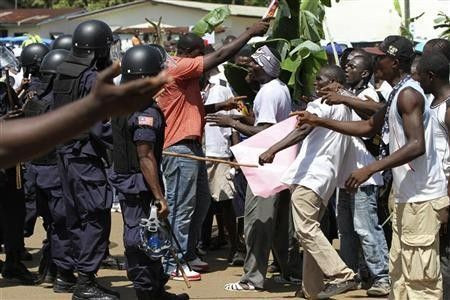Violence, boycott call deter Liberia voters

Many Liberians failed to vote in a presidential run-off on Tuesday, poll observers said, some people staying away for fear of further violence and others following an opposition boycott appeal.
Voters trickled into polling stations in the capital Monrovia in much lower numbers than the first round vote last month, Reuters witnesses said. Feedback from elsewhere in the West African state also put turnout down by late-afternoon.
Incumbent Ellen Johnson-Sirleaf is tipped to win re-election after leading the first round vote, and because second placed challenger Winston Tubman has withdrawn from the contest citing electoral fraud.
But a low turnout risks harming Johnson-Sirleaf's authority in a new term despite international praise for the new Nobel peace laureate and broad condemnation of Tubman's boycott call.
United Nations peacekeepers were deployed, but the streets of the capital were quiet after a day of clashes that officials say killed at least two.
People are taking a long time to come because of the situation of yesterday. There is fear in the voters, said Mitchell Gbarteah, an election worker in Monrovia's West Point, a slum of tin and wood hovels.
Officials from two observer groups said low numbers were also being reported by colleagues country-wide.
We have spoken to our observers across the country and the indication that we are getting is that turnout is very low, said Dan Saryee, head of the Liberia Democratic Institute, which is tracking the vote.
If it continues the way it is going now, I can safely say that turnout will be 25-35 percent, he said. In the Oct 11 first round vote, turnout was more than 71 percent.
The poll is the first locally-organised presidential election since a civil war ended in 2003. It is expected to pave the way for new investment, but fears are rising it could instead usher in open-ended political turmoil.
On one street corner in the crumbling coastal capital, a group of two dozen young men stood discussing politics.
I will never vote, the government has stacked things massively against us ... They came in there shooting, not just teargas, at harmless people said Anthony Korvayan, 28.
On Monday, police fired tear gas to disperse hundreds of Tubman's supporters and officers also fired live rounds when they stormed Tubman's CDC party headquarters.
But, standing next to Korvayan, Benedict Hena held up an ink-stained finger, and said he had voted: It is our right.
U.S. President Barack Obama called on Liberian security forces to show restraint and allow peaceful protest, and he warned against any voting violations.
The international community will hold accountable those who choose to obstruct the democratic process, he said.
Two radio stations seen to support Tubman and running mate and former football star George Weah, were shut down overnight.
After voting in Fefee, her home town just outside Monrovia, Johnson-Sirleaf sought to dampen tensions, saying she regretted the loss of life and promised an investigation.
Liberia is going to move forward. We will find a way to heal the wounds. We will also find a way to reconcile people, she said, vowing to make youth a priority of her mandate.
However, Tubman, a former U.N. ambassador, accused the president of using violence against peaceful people. On Tuesday he remained vague on his next move. We will boycott today and wait and see how that pans out.
Liberia is one of the world's poorest countries and some 14 years of war killed nearly 250,000 and left its infrastructure in ruins.
DON'T WANT TROUBLE
Johnson-Sirleaf -- whose standing at home, where many complain improvements have come too slowly, is not always on a par with international praise for the recently-named Nobel Peace Prize winner -- won nearly 44 percent of the first round vote.
She has since secured the backing of the third-placed finisher, former warlord Prince Johnson.
Tubman, who won about 33 percent in the first round , has alleged three ballot boxes were tampered with and said he would only participate in a run-off if it were delayed by two to four weeks and if counting procedures were amended.
The October 11 first round was broadly accepted by international observers and regional bodies have criticised Tubman's boycott decision.
Yet many of his supporters are unemployed former fighters and, while it is too early to be sure of turnout, analysts warned a successful boycott would complicate the incumbent's next mandate, perhaps forcing her into dialogue with Tubman.
Instead of consolidation and construction, it will be a second mandate of justification and possibly power-sharing, said Lydie Boka, head of risk consultancy StrategiCo.
Liberia's iron ore and oil have already attracted major firms including ArcelorMittal, BHP Billiton and Anadarko Petroleum and a smooth poll could entice more.
Many in Liberia are just hoping for peace.
We don't want any trouble. But monkey and baboon not getting along, said a Monrovia resident who called himself Tarr, using the nicknames Liberians have given the candidates.
© Copyright Thomson Reuters {{Year}}. All rights reserved.





















